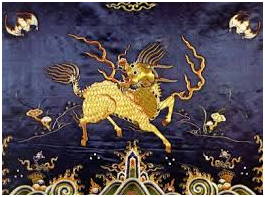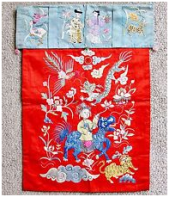



Peking (Beijing) Opera
Chinese Cultural Heritage
"To know China, see Peking Opera"
Peking Opera is the like of classical music, Russian Ballet, Italian Opera or Japanese Kabuki. You are congratulated for being able to enjoy these cultural heritages which enrich life, enormously. Please be patient/tolerant to the entirely 'foreign' singing/music styles. Young men sing in falsetto since their voice hasn't deepened. As for the 'painted faces', each is specially created to fit a particular historical figure's character whether it's daring, bravery, bullying, toughness, honor/courage (red face), clownish (white circle around the nose) or ruthless/trickery (white face).
The stage is bare, it forces the viewer to focus totally to each actor's action & expression, skills taking decades to learn/practice, starting at toddler's age. In ancient times, horse was indispensable. It is represented by a whip with tassels. Please discern the mounting, riding, galloping and tying the horse to a (imaginary) post. Plenty of pantomime, acrobat and martial arts.
1. Ax the Coffin 《大劈棺》
Ax the Coffin is taken from the 3rd chapter of the book "Stories to Caution the World" (警世通言), published in 1626 of Ming Dynasty. It is associated to the teachings of the great philosopher Zhuangzi (莊子), born 2500 years ago. The other name is "Zhuangzi tests his wife" (of her chastity), as we all like to know our beloved one's fidelity. The story uses Zhuangzi's magical power to self -replicate, to conceal his body, to metamorphose. it's a metaphorical tale with Zhuangzi creating a hard-to-solve dilemma, just like the poet, Robert Frost's "The Road Not Taken". The plot confronts all walks of life to make individual decisions, with intriguing outcome.
2. Farewell My Concubine 霸王别姬
The First Emperor of China, Qin Shi Huong (秦始皇), unified the country over 2000 years ago, in 220 BC. He started to build the Great Wall and constructde the Terra Cotta soldiers before he died in 210 BC.
The country was then thrown into chaos, with fierce fightings between 2 leaders, Liu Bang (刘邦) and Xiang Yu (项羽). The epic history is described at the beginning of the play, with both Chinese and English subtitles.
3. Legend of the White Snake 白蛇传
The story originates in Ming Dynasty (明朝), circa 1624 AD, one source is from the collection of Stories to Caution the World (警世通言).
This is a love story plots to overcome discrimination. Rather than discrimination among different groups of people, here, discrimination is extended to animals. In Buddhist doctrine, animal is sacred as human being, any human can be reborn as animal, and vice versa. We often hear that monks do not kill even a fly.
A White Snake who meditates for hundreds of years at Mount Emei, to acquire the ability of transforming itself to other forms. It longs to experience the seemingly joyful human world by transforming to a beautiful woman named Bai Suzhen (白素贞). Along with her maid, the Green Snake (小青), she travels to the city of Hongzhou. At the scenic West Lake, she met and fell in love with a young man named Xu Xian (许仙). They are soon married but not live happily ever after.
The problem is a hateful, evil monk named Fa Hai (法海) who discriminates non-human beings, is determined to purge the White Snake. Life-and-Death battles ensue which nearly dooms the poor White Snake.
4. Tragic Death in the Red Chamber 《尤三姐》
5. Unicorn Purse (锁麟囊 Suo Lin Nang)
Suo Lin Nang (Unicorn Purse) is literally “locked-in Qilin in Pouch”.
Qilin (麒麟) is a mythical animal of the Orient. It has a lion’s head, dragon’s body (with scales), antler’s horns and deer’s hooves. It symbolizes royalty, wealth and fertility.
It’s often a charm gift to a bride so she shall bear a son soon.
This is a story of ‘reversal of fortune’, about the happenings of 2 young brides, one is fabulously rich, the other one, dirt poor.
Please pay a special attention to the 2 maids, one at the beginning, the other, later on. They are played by male actors, in comical, exaggerated, roles, aimed to amuse. They are portrayed as uneducated, earthy, ignorant, naïve and shallow, often being seen as rude but are just tactless, a contrast to the refined, elegant, thoughtful, brides.


Enjoy.
Opinions are welcome/appreciation, please contact:
Dr. Shuang Xin Tsao Private Foundation
Email: [email protected]WeChat 微信: Live$567, Blvd12345
Tel: 347-497-4014, Cell: 917-716-1813